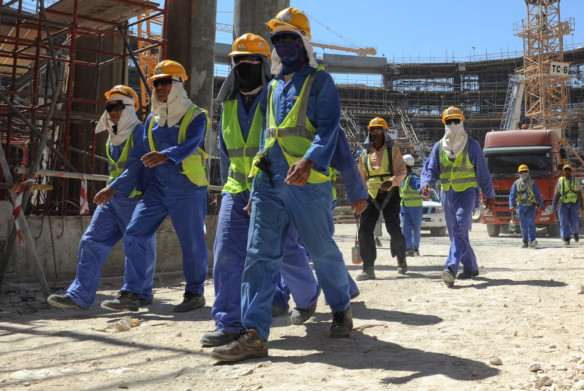
London: Qatar should make electronic payment of wages to migrant construction workers mandatory to address one of their biggest concerns: non-payment and late payment of wages, an engineering group has said.
Engineers Against Poverty, a UK-based NGO, presented the recommendation, along with others, to representatives of contractors and banks at a recent meeting in Doha at the launch of the Improving employment standards in construction in Qatar report.
The Gulf state has come under intense international pressure to prevent exploitation of migrant workers in the build-up to the 2022 football World Cup. Unions have warned that labour conditions in the country could result in up to 4,000 deaths before the tournament begins.
Representatives of the families of migrant workers who have been killed and injured on building sites in Qatar have called on Fifa, the world football governing body, to hand the tournament to another country unless the Doha leadership can guarantee worker safety.
In its report, Engineers Against Poverty said electronic payment would provide workers with the evidence needed to prove they had not been paid and allow them to seek redress.
“Non-payment and late payment of wages is one of the biggest concerns to migrant workers. It is also a potential source of disruption and delay to projects, and therefore a major risk to government clients and their project management consultants,” Jill Wells, the research team leader, said.
Workers, who are usually paid in cash, often have to borrow large sums from moneylenders at high rates of interest to pay recruitment fees. It is critical for them to receive wages on time and in full so debts can be repaid promptly.
The report argues that while there are limits to the control contractors can exert over subcontractors, the former can do more to ensure that all workers receive their wages on time. It says clients should consider including clauses in their contracts with main contractors requiring them to pay the wages of their subcontractors’ workers if the latter fails to do so. Such legislation exists in India.
The main complaint from workers who come to Qatar’s National Human Rights Committee for help is about late wage payments. A third of the 1,100 labourers surveyed by the NHRC said they never received their wages on time.
In 2010, 93 per cent of the complaints handled by the ministry of labour were about delayed wages and two-thirds of complainants were construction workers. In 2012, the ministry received 6,000 complaints, with wages and denial of benefits the main problems.
Some contractors told Engineers Against Poverty that they paid cash in hand because most workers earn less than the minimum salary required to open a bank account. Yet the NGO said three companies were paying salaries to workers earning less than half of this amount by electronic bank transfers.
One contractor told Engineers Against Poverty that while providing accounts to low-paid workers was not profitable for banks, they could be persuaded to do so as banks hoped to secure more profitable lines of business from the big contractors.
“Paying through electronic bank transfer could provide workers with evidence to prove they have not been paid and allow them to seek a transfer of sponsorship,” the report says. But as this is no guarantee of prompt payment, the main contractor should step in if subcontractors fail to pay workers on time.











